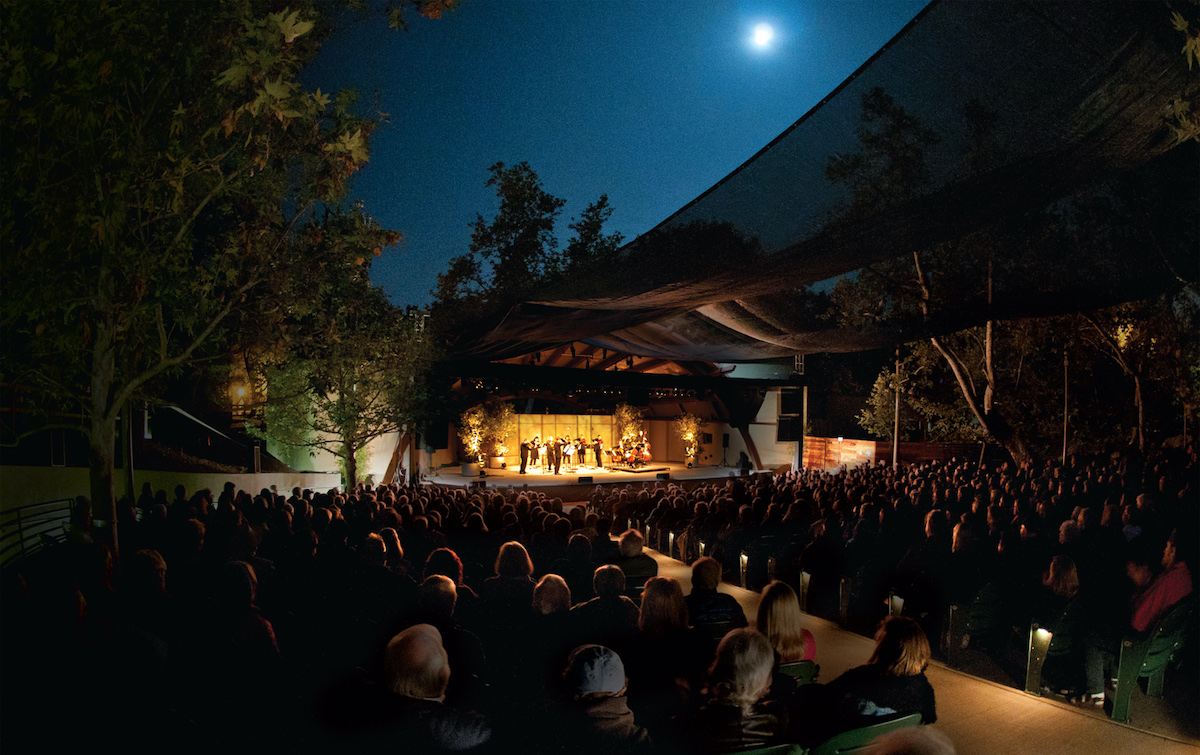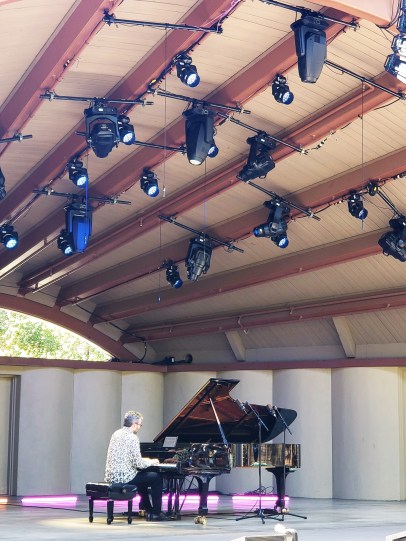Review | A Wrap on the Ojai Music Festival
New Music Village Beat, Squared

For all its worldly trappings, as an annual gathering point for internationally-respected musicians composers, conductors, plus visitors and press from near and far, the unique power of the Ojai Music Festival (ojaifestival.org) is partly rooted in its “village” concept. As the cliché goes, it “takes one” to pull all the festival pieces together and it is one, a golden west coast destination spot.

To that list, we can add that it hosted a village unto itself this past weekend, in the form of the self-contained but always collaboration-eager young NYC-based group American Music Opera Company (AMOC*). After 75 years of one or two visiting music directors each year, this was the first time a group was invited — by executive director Ara Guzelimian — to take over the Ojai Fest “village.” They took on the challenge, with glee, lateral thinking, imagination, and energy.
Founded in 2017 by Matthew Aucoin and Zack Winokur, AMOC* served up an unusually thick, maybe too thick, schedule of concerts and modern dance — such as the powerful, fourth wall-minded Open Rehearsal. The token opera was Doug Balliett’s silly, and thankfully short, comic pop opera number Rome is Falling, in the Libbey Park gazebo. In all, AMOC* created a rich if rambling, smorgasbord-ish self-portrait of what they’re about. This smart, artful traveling circus came out west and impressed.
The late Julius Eastman, a gay black renegade minimalist who died in relative obscurity in 1990, has enjoyed belated attention in the contemporary music scene in recent years and had his spotlight in Ojai this year. The festival opened with should-be superstar bass-baritone Davóne Tines intoning the hypnotic a cappella Prelude to the Holy Presence of Joan d’Arc, and closed on Sunday evening with Stay On It, with an all-Eastman program on Friday morning. That five-work set showcased the composer’s striking Gay Guerrilla, a rough, renegade minimalist masterpiece.
TINES TIME
Ojai 2022’s major setback was the absence of trailblazing soprano Julia Bullock, laid low by COVID just days before the festival’s start. Without her, the festival had to sideline the major new semi-staging of Olivier Messiaen’s song cycle Harawi and Messiaen was missed in the program’s overall balance.
By serendipitous happenstance, though, Friday’s substitution cast a deserved spotlight on the truly remarkable and flexible Tines, in a suite-like tapestry of Carolyn Shaw’s No. 1: MASS, J.S. Bach, Tyshawn Sorey, and re-arranged gospel/spiritual settings. Clearly, Friday night was Tines’ night, and a high point of the festival.
Tines, it so happens, has been a major presence in the 805 just within a few months, starting with the innovative musical theater invention Everything Rises, created with violinist Jennifer Koh, which had its world premiere at Campbell Hall in April. Ironically, one sub-theme of that piece, concerning the odd tension of the classical world’s audience and patronage system and people of color, was sadly cross-referenced in Ojai. In the midst of the reconfiguring hymn “Balm in Gilead,” Tines slipped into preacher mode, relaying his experience the night before of having a woman tell him “I don’t like anything about you, but I love your voice.”
Sign up for Indy Today to receive fresh news from Independent.com, in your inbox, every morning.
MORNING MUSINGS

Apart from the higher-profiled evening fare, such as the Saturday night focus on the multi-gifted composer-conductor Aucoin’s double shot of works (including the world premiere of his prodigious if unanchored sampler plate Family Dinner) there were great reasons to get up early. Friday at Zalk Theater, a contingent of game AMOC* admirably took on the organized improvisation schemes of black jazz/new music titans George Lewis and Roscoe Mitchell (both were in Ojai during the 2017 festival, directed by Vijay Iyer). Saturday morning cellist Jack Campbell (the “C” in the JACK Quartet) entranced us on the theme of one 45-minute note—albeit with a roving rainbow of microtonal variations and beats-between-notes, courtesy of composer Catherine Lamb’s cross/collapse.
On Sunday morning, pianist Conor Hanick (on the faculty of the Music Academy of the West) gave what, to these ears, was a clear festival highlight — a rare and sensitive performance of German composer Hans Otte’s complete hour-plus solo piano work The Book of Sounds. Somehow, Otte ventures from his cooler-headed Minimalist style to tonal detours, with influences of Messiaen, Satie and even a touch of his compadre Karlheinz Stockhausen in the almost mystical mix.
Hanick also captivated with his Tyshawn Sorey’s new For James Primrosch, commissioned by the Music Academy. The dreamy-stately piece again reveals Sorey’s unapologetic debt to hero Morton Feldman, but to artful, next-generation ends.
COME EARLY, COME ANEW

I heard a DJ on KCSB describe the Ojai Festival as “extremely avant-garde,” which is by now an untruth. In recent years, the festival has strived to balance its own deep commitment to contemporary and experimental music with sounds from other shores, idioms and earlier “serious” music periods. Last year’s ear-friendly John Adams-directed program featured Rhiannon Giddens — slated as next year’s music director, in a move obviously geared towards luring a more general audience.
This year, the connection between early and new — a central tenet in AMOC* land — reared its head in the “About Bach” program.” AMOC*-linked group Ruckus played new arrangements of Bach Flute Sonatas (lovely, except for two horrific jazzing-up-Bach movements), capped off with Cassandra Miller’s fascinating About Bach, a hypnotic and vaguely Arvo Pärt-reminiscent reframing of Bach’s famed Chaconne in D.
A highlight of Thursday night’s program — and the festival — gently-moved from Michael Hersh’s profound, mind-altering flute-piano piece Scars Plummet to the Corners followed by the composer’s arrangement of music by Orlando Gibbons (1583-1625). In short, new met early in Ojai this year, and got along famously.
Sunday’s closer featured a menu of off-radar Baroque music by Ruckus, featuring counter-tenor Anthony Roth Costanzo, and idle spritzers of Phillip Glass – making the critical in-house point of Minimalism’s sympathies with early music. It all closed with Eastman’s Stay On It, in which all musicians and dancers get down on it, in alternately ecstatic and entropic ways, grooving on the work’s sly soul riff, dissolving into disassembled chaos and locking back into the riff/groove. Rinse, repeat, recharge. As in life.
ON the Beat is the new all-things music and music-adjacent column by music/arts journalist-critic Josef Woodard, who has written for the Independent since its beginning (and even for the predecessor weekly the News & Review). He wrote the “Fringe Beat” column for 25 years, but “ON the Beat” is more inclusive, preaching the gospel of eclectic musical tastes.
Woodard grew up in Santa Barbara, soaking in/writing about music locally and internationally. He wrote for the Los Angeles Times for a quarter century, and has contributed to Rolling Stone and Entertainment Weekly, and continues contributing to DownBeat and elsewhere, and has published books on jazz legends Charlie Haden and Charles Lloyd. His debut novel, the salty-satirical Ladies Who Lunch, dropped in 2021. He is also a musician-songwriter-situationist with albums out on Household Ink Records.
Support the Santa Barbara Independent through a long-term or a single contribution.




You must be logged in to post a comment.